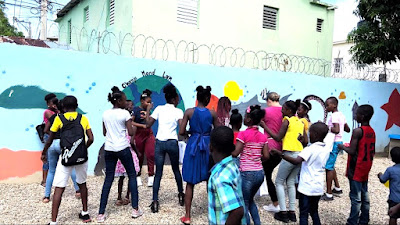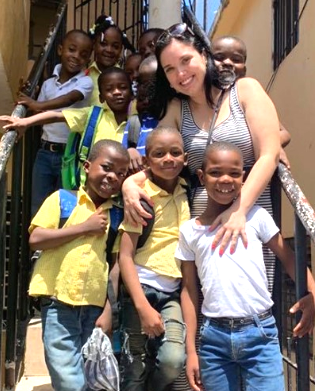Darrel L. Hammon
In 2008, Kate Bateman, a young Canadian, went on vacation with her family to Puerto Plata, Dominican Republic. She loved the beauty of the island — the turquoise water, sandy beaches and the people. Her mood changed when she encountered young children working on the beach, begging and shining shoes. She wondered why they were not in school.
Soon, she learned a hard truth. These Haitian children living in the Dominican Republic did not go to school. Her vacation allure quickly dissipated into how she could help these children obtain their
dream — or even instill in them a dream for something better.
Kate returned to Puerto Plata for a few years to check up on the young children she had met. Before she went, Kate gathered school supplies, clothing, and basic medical supplies to donate.
On each trip, she would gather more things to donate, only to discover that the children’s situations had not improved. She needed to do more than bring perishables to these children. Her epiphany came to her: They needed the education to climb out of the abyss of poverty.
After years of trips, a 21-year-old Kate Bateman formed Youth Upliftment International (In French: Amélioration Jeunesse Internationale), a nonprofit organization working on behalf of impoverished Haitian youth living in Puerto Plata.
According to Youth Upliftment International, the organization’s goal is “to provide students with a high-quality education, while also meeting their basic needs.”
 |
The school is named Collège Amélioration Jeunesse — also fondly known as “Kate’s school” — and currently has students enrolled in pre-school to fundamental 6, which is the equivalent of 6th grade. The school is a simple one, snuggled between several buildings along a moderately busy street.
The typical student was born and raised in Haiti, or born in the Dominican Republic to Haitian parents, and comes from 11 different communities across the sprawling city. Kate beams when she says, “They are excited about learning and treat their teachers and peers with kindness.”
The typical student was born and raised in Haiti, or born in the Dominican Republic to Haitian parents, and comes from 11 different communities across the sprawling city. Kate beams when she says, “They are excited about learning and treat their teachers and peers with kindness.”
Most of the school’s teachers are Haitians. Some of the teachers have taught in Dominican schools but, according to Kate, “choose to work with us as they want to see children from their community educated. Our best teachers are those who are well-known members of the Haitian community, either as pastors or community leaders.”
Teacher and staff development is important to the school. At the start of every academic year, teachers attend a week-long staff development dedicated to teacher training. “We try and collaborate with other schools and charities for additional staff training and teacher development,” Kate said. “We are always looking for opportunities for our teachers to grow into better educators.”
Teaching a holistic curriculum is important to Kate. She said, “Our curriculum is a combined one. We use parts of the Haitian, Dominican, and Canadian (Quebec) curriculum so that our students are well rounded.”
For Kate, though, learning languages is key. In addition to Spanish, students are taught to read and write in French and Haitian Creole.
 |
| New Parent Group |
“Many of our students and their families do end up back in Haiti. Sometimes this is due to deportation, other times on their own free will,” she said.
Kate hopes the Collège Amélioration Jeunesse one day becomes an accredited learning center (Centro Educativo) in the country.
While they move through the arduous process of becoming a learning center, their goal is to see every child who attends the school graduate. Upon graduation from the school, students have two options.
“They can attend public high school, or if their grades are very good ( 90-95% average) and they show leadership qualities, we fundraise to put them in a private high school where the quality of education is much better,” Kate explained.
Maintaining and growing a school is not a not easy task. Kate praises the community groups and churches for their additional efforts in making the educational dream a reality.
No matter how challenging it may be to educate these young Haitian students, Kate finds a way to be happy and positive: “For all of the hardships and challenges we encounter, there is always something positive happening.”
When Kate talks about her biggest accomplishment, she doesn’t hesitate. “We are so excited to be celebrating ten wonderful but challenging years,” she said. “I feel very proud that our school belongs to the Haitian community. It is a safe space where our students are celebrated for being who they are and what they are becoming.”
The future is wide open for the Collège Amélioration Jeunesse. Kate’s goal is to offer more educational programs, have students attend English classes every day and offer additional extracurricular activities during the weekend. But in order for Kate to accomplish these tasks, she needs financial help.
“Many of our students come from homes where they do not have access to healthy balanced meals. The one nutritious meal they can look forward to in a day is at school. To feed all of our students each month the cost is $3,260 CND (approximately $2,400 US),” she said.
Two Canadian sisters, Sheila and Kathy, are co-directing a student sponsorship program for Kate’s students on behalf of the Dominican Starfish Foundation. The two recently attended the 10th-anniversary celebration at the school, saying, “Kate truly is a modern-day Mother Theresa, truly a selfless person. Her school is more than a school. It is a refuge from a difficult and cruel world.”
Karen, a supporter and advocate for the school, interviewed Kate for a research component in her Master of Leadership Program in Canada. She called Kate’s work “extremely humbling” and praised her efforts on the island.
Kate has a message for those who want to help: “Human connection is what motivated me to make a change,” offered Kate. “We could use your support and certainly appreciate it! Every person, every organization, can make a difference. Be curious, keep asking questions, and become involved. I also invite anyone interested in seeing what we are all about to come and see for themselves. We love and appreciate visitors!”
To contact Kate, you can go online to www.youthupliftment.org or go to Facebook and Instagram: youth upliftment international.
You can also read this article published in the Daily Herald (Provo): https://www.heraldextra.com/












No comments:
Post a Comment